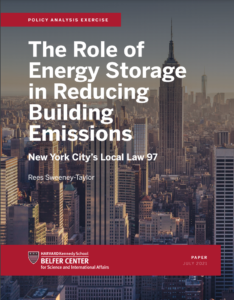Full Title: The Role of Energy Storage in Reducing Building Emissions: New York City’s Local Law 97
Author(s): Rees Sweeney-Taylor
Publisher(s): Belfer Center for Science and International Affairs, Harvard Kennedy School
Publication Date: July 9, 2021
Full Text: Download Resource
Description (excerpt):
The New York City Council passed the Climate Mobilization Act in April of 2019, charting a path forward to net-zero greenhouse gas emissions by 2050. Central to the Act is Local Law 97 (LL97), which places a declining cap on emissions from the city’s largest buildings and is considered “the most ambitious building emissions legislation enacted by any city in the world.” The building sector accounts for two-thirds of emissions in New York City, and given the law’s high penalty—$268 per metric ton of CO2-equivalent (tCO2e)—LL97 is expected to dramatically reduce those emissions over time. Buildings can pursue a variety of pathways to reduce their emissions below the cap, including changing fuels, upgrading appliances, retrofitting, reducing use, and installing distributed solar generation.
LL97 also includes specific language authorizing a deduction in emissions for energy storage based on the size of the storage system and its “ability to reduce greenhouse gas emissions during designated peak periods.” However, the law does not define the size or manner of the deduction that building owners will receive. Determining avoided emissions from storage proves challenging since it operates on the electric grid both as a load, potentially increasing emissions when it charges, and as a generator, potentially offsetting emissions when it discharges. Under the law, a Climate Advisory Board and its eight working groups are conducting analysis on storage emissions and other undefined aspects of the law in order to provide recommendations to the Department of Buildings (DOB) by January 1, 2023. The DOB, in conjunction with the Mayor’s Office of Sustainability, will promulgate final rules in advance of the beginning of the first compliance period in 2024.
